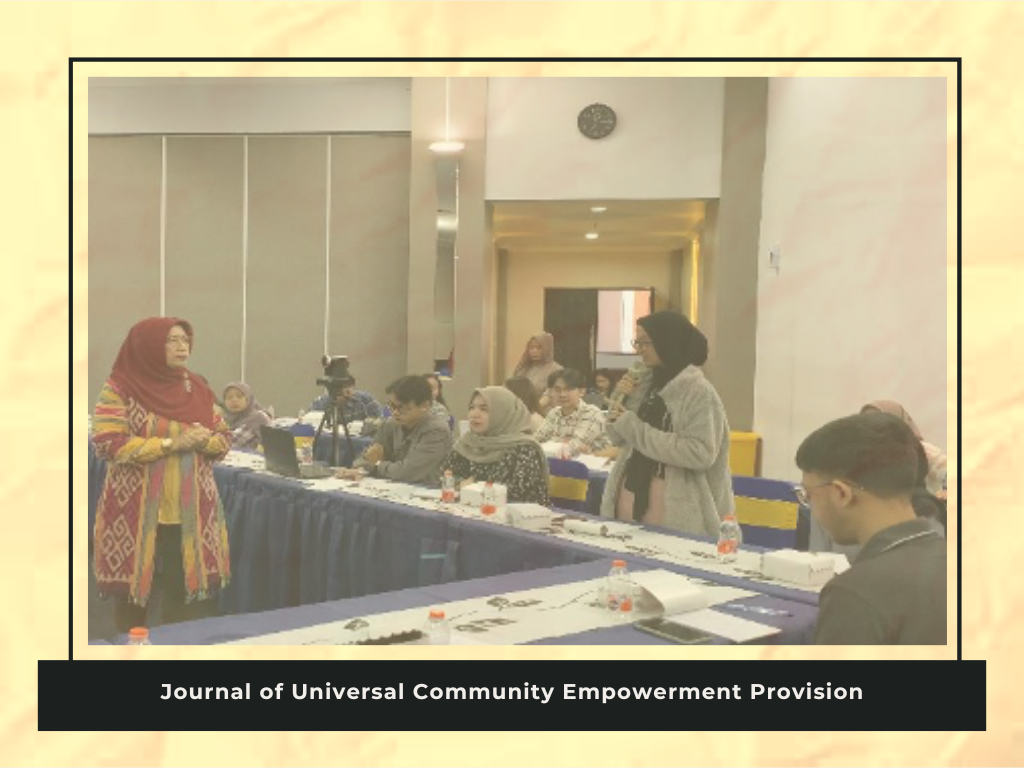Research Transformation through Multi-Paradigm Methodology Training for Undergraduate Accounting Students
DOI:
https://doi.org/10.55885/jucep.v4i1.371Keywords:
Research Methodology Services, Qualitative Methodology, Multiparadigm Methodology, Research Training Services, Student Research MethodologyAbstract
The exploration of scientific disciplines is not only monodisciplinary but has developed into transdisciplinary, even multidisciplinary. Faculty of Economics and Business Universitas Brawijaya is a producer of scientific research, but unfortunately undergraduate students still have limitations related to multi-paradigm research methodology. The implementation of this Multiparadigm Methodology Training activity aims to provide an understanding of alternative methodologies in research using qualitative methods for accounting undergraduate students. The main focus is to increase students' understanding and awareness of Multiparadigm Research Methodology. the techniques used in this PKM activity are pre-test, material presentation, post-test, and question and answer discussion. The method for assessing the success of this activity uses different tests from the pretest and post-test results. The data results will be tested using a paired sample t test with the object of this PKM research, namely undergraduate accounting students of FEB Universitas Brawijaya who attended the activity. The results of the t-test show that (1) descriptive analysis of the average value shows an increase from 59.2 to 94.1; (2) The statistical test results show that there is a significant difference between the pre-test and post-test, which indicates that there is a significant effect after the treatment. The statistical test results confirm that there is a significant effect on the participants' scores before and after receiving the treatment, as well as a significant increase in the participants' average scores, which shows that the exposure to the materials provided is quite effective in improving their understanding in Qualitative Methods Training. The implication of this research is that participants have a broader insight into muti-paradigm methodology and can apply it in research.References
Amboni, N., Caminha, D. O., Andrade, R. O. B. de, & Fernandes, M. (2017). Multiparadigmatic approaches in organization studies: developments and limitations. 10(5), 808-827. https://doi.org/10.5902/1983465912620
Anand, Dr. M. D. (2024). Research Methodology: Methods And Techniques. https://doi.org/10.59646/rmmt/171
Assyakurrohim, D., Ikhram, D., Sirodj, R. A., & Afgani, M. W. (2022). Case Study Method in Qualitative Research. Journal of Science and Computer Education, 3(1), 1-9.
Chanifah, N. (2020). Innovation of integrative-interconnective Islamic education based on direct experience in Universitas Brawijaya Malang. 1(3), 251-261. https://doi.org/10.12928/IJEMI.V1I3.2593
Cole, C. S. G., Chase, S. W., Couch, O., & Clark, M. (2011). Research Methodologies and Professional Practice: Considerations and Practicalities. The Electronic Journal of Business Research Methods, 9(2), 141. http://ema702.weblog.esaunggul.ac.id/wp-content/uploads/sites/187/2013/01/Riset-Bisnis-Pertemuan-7.pdf
Desai, Ms. K. (2024). Research Methodology. https://doi.org/10.59646/rm/141
Gao, Y., Wang, Q., & Zhang, N. (2017). Robust Statistics Analysis and Difference Significance Test of the Test Data of Laboratory Proficiency Testing. DEStech Transactions on Computer Science and Engineering. https://doi.org/10.12783/DTCSE/ICEITI2016/6117
Ghirotto, L., De Panfilis, L., & Di Leo, S. (2020). Health professionals learning qualitative research in their workplace: a focused ethnography. BMC Medical Education, 20(1), 269. https://doi.org/10.1186/s12909-020-02191-5
Gomez, J. (2016). Educational Research in Higher Education: Methods and Experiences. In Social Science Research Network.
Gretschel, P., Ramugondo, E., & Galvaan, R. (2023). Linking Paradigms and Methodologies in a Qualitative Case Study Focused on Exploring the Operation of Power in Human Actions During the Design of a New Occupational Therapy Intervention. The International Journal of Qualitative Methods. https://doi.org/10.1177/16094069231187590
Iofrida, N., Luca, A. I. De, Strano, A., & Gulisano, G. (2018). Can social research paradigms justify the diversity of approaches to social life cycle assessment. International Journal of Life Cycle Assessment, 23(3), 464-480. https://doi.org/10.1007/S11367-016-1206-6
Jokela-Pansini, M. (2019). Multi-sited research methodology: Improving understanding of transnational concepts. Area, 51(3), 516-523. https://doi.org/10.1111/AREA.12494
Kusdiantini, A., Tjahjati, S. S., Sudrajat, A., & Ariani, N. D. (2023). Community Service Activities (PKM) Health Check and Counseling in Tegalega Field Environment Bandung. Padma, 3(1), 92-102.
May, K., & Hittner, J. B. (2003). On the relation between power and reliability of difference scores. Perceptual and Motor Skills, 97(3), 905-908. https://doi.org/10.2466/PMS.2003.97.3.905
Overall, J. E., & Tonidandel, S. (2010). The Case for Use of Simple Difference Scores to Test the Significance of Differences in Mean Rates of Change in Controlled Repeated Measurements Designs. Multivariate Behavioral Research, 45(5), 806-827. https://doi.org/10.1080/00273171.2010.519266
Prabhavathy, Dr. R. A., Gracida, Mrs. M. M., & Pratheesh, Mr. C. (2024). Research Methodology: A Step-By-Step Guide For Beginners. https://doi.org/10.59646/rm/187
Scheufele, B. (2023). Special Session: Creating Synergies from Multi-Method Research Approach: An Abstract (pp. 295-296). https://doi.org/10.1007/978-3-031-24687-6_118
Talib, M. A. (2022). Cultural Accounting Research Design Training Using Qualitative Methods. Communal Journal of Community Service, 1(1), 7-14.
Talib, M. A. (2022). Training on Data Collection Techniques in Qualitative Methods for Cultural Accounting Research. Seandanan: Journal of Community Service, 2(1), 44-50.
Wiraguna, S., Purwanto, L. M. F., & Rianto Widjaja, R. (2024). Qualitative Research Methods in the Era of Digital Transformation. Arsitekta: Journal of Architecture and Sustainable Cities, 6(1), 46-60.
Yardley, S., Mattick, K., & Dornan, T. (2019). Close-to-Practice Qualitative Research Methods. https://doi.org/10.1093/OXFORDHB/9780198795872.013.18

Downloads
Published
How to Cite
Issue
Section
License
Copyright (c) 2024 Journal of Universal Community Empowerment Provision

This work is licensed under a Creative Commons Attribution-ShareAlike 4.0 International License.














